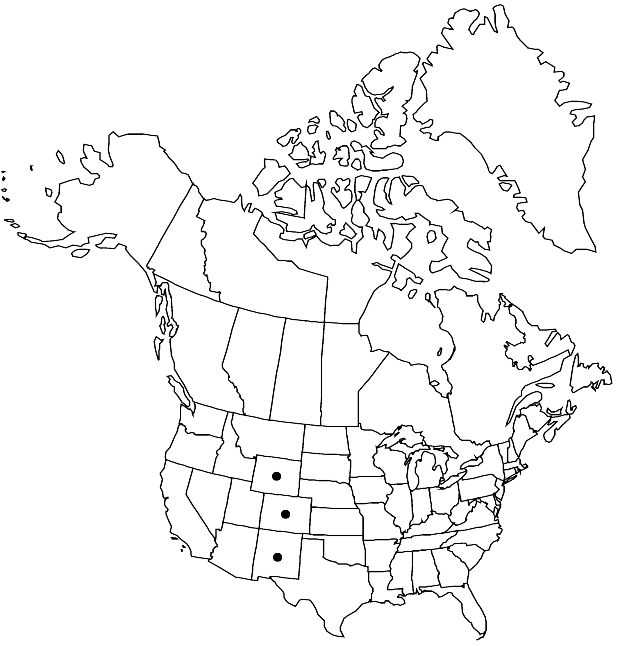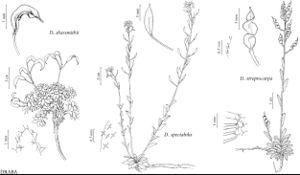Draba streptocarpa
Amer. J. Sci. Arts, ser. 2, 33: 242. 1862.
Perennials; (tufted); caudex simple or branched (covered with persistent leaf remains); not scapose. Stems usually unbranched, (0.2–)0.4–2.5 dm, hirsute proximally, sparsely pubescent or glabrous distally or throughout, trichomes simple, 0.4–2.2 mm, often with stalked, 2(–4)-rayed ones, 0.2–1 mm. Basal leaves rosulate; blade oblong-oblanceolate to linear-oblanceolate, 0.5–3.8 cm × 1.5–6 mm, margins entire, (ciliate, trichomes setiform, simple, 0.6–2.8 mm), surfaces strigose to hirsute abaxially with long-stalked, 2(–4)-rayed trichomes, 0.4–1.4 mm, usually with simple ones, strigose adaxially with simple trichomes, 0.7–2.4 mm. Cauline leaves 2–15; sessile; blade oblong to lanceolate, margins entire, surfaces pubescent as basal. Racemes 9–62-flowered, ebracteate or proximalmost 1–3 flowers bracteate, elongated in fruit; rachis not flexuous, sparsely pubescent as stem or glabrous. Fruiting pedicels ascending, slightly curved or straight, 4–12 mm, glabrous or pubescent abaxially, trichomes simple (0.4–1.6 mm). Flowers: sepals oblong, 2.5–3.5 mm, usually pubescent, rarely glabrous, (trichomes simple, sometimes with stalked, 2-rayed ones); petals yellow, oblanceolate to spatulate, (4–)5–7.5 × 1–2(–2.5) mm; anthers ovate, 0.5–0.7 mm. Fruits ovate to linear-lanceolate, usually strongly twisted (to 3 turns), rarely plane, flattened, 5–16 × 2–3 mm; valves puberulent along margin, trichomes simple, 0.05–0.3 mm; ovules 20–34 per ovary; style (0.8–) 1–2(–2.5) mm. Seeds ovoid, 0.9–1.2 × 0.6–0.7 mm. 2n = 20, 40.
Phenology: Flowering May–Jul.
Habitat: Rock outcrops, hillsides and meadows in open mixed conifer forests, aspen groves, and alpine tundra communities
Elevation: 2400-4000 m
Distribution

Colo., N.Mex., Wyo.
Discussion
Draba streptocarpa is easily recognized by its strongly twisted fruits and broad-based, simple cilia on the basal leaves. It is found primarily in Colorado, but has also been collected in Larimer County, Wyoming, and Mora, San Miguel, and Taos counties, New Mexico.
Selected References
None.
